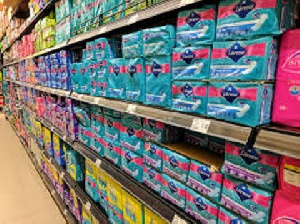A group of Civil Society Organisations demanding government’s removal of taxes on sanitary pads has backed the Member of Parliament for Madina, Francis-Xavier Sosu’s move to present a private member bill proposing an amendment to remove the 15 per cent Value Added Tax (VAT) on menstrual hygiene products to parliament.
Spokesperson for the group, Ama Pratt, speaking in an interview with Citi News called on parliament to approve the bill.
She said, “Not only is it in line with what we are asking for. He takes it a step further, and he wants to do it in a way that not only does it apply to this administration but all future administrations, so nobody can try this again. And definitely, that is what we have been yearning for. All of these advocacies are just so that these taxes go away. These are commitments.”
"...In this country, we talk a lot, and we sometimes get the wrong things done,” Ama Pratt stated.
Bill to remove 15% sanitary pad tax presented in parliament
Member of Parliament for Madina, Francis-Xavier Sosu, on Thursday, September 21, 2023 presented a private member bill proposing an amendment to remove the 15 per cent Value Added Tax (VAT) on menstrual hygiene products to parliament.
The proposed bill also seeks to push for the reclassification of the 20 per cent import tax on final consumer goods to zero-rated essential social goods.
The Madina MP enunciated there is period poverty among some women in the country.
Francis-Xavier Sosu pointed out that the bill presented to parliament is aimed at addressing the menstrual hygiene needs of women and girls.
He said this was geared towards the Sustainable Development Goals one, three, four, five, six and 10.
“Despite the fact that about a quarter of the world’s population menstruates, 500 million people have been left without access to menstrual hygiene products, leading to period poverty,” the Madina MP said.
“Period poverty, thus refers to the struggle to afford menstrual products, and the increased economic vulnerability menstruating people face due to the financial burden posed by menstrual supplies,” he added.
The high cost of sanitary towels in Ghana has led some women to deploy other means and materials to use during menstruation.
Reports suggest that some women use unconventional materials such as untreated fabrics, tissues, and even corn husks as menstrual pads, with some resorting to diapers.
Sanitary items, labelled as luxurious by government attracts 32.5 percent tax on imported sanitary pads which is made up of 20 percent import duty and 12.5 percent in Value Added Tax.
SA/OGB
Ghana’s leading digital news platform, GhanaWeb, in conjunction with the Korle-Bu Teaching Hospital, is embarking on an aggressive campaign which is geared towards ensuring that parliament passes comprehensive legislation to guide organ harvesting, organ donation, and organ transplantation in the country.
Watch the latest edition of BizTech and BizHeadlines below:
Business News of Tuesday, 26 September 2023
Source: www.ghanaweb.com













